

Picking Up the Mantle of the Family Business
As his father battles illness, young entrepreneur works to preserve a family legacy while calling for collaborative development in his hometown
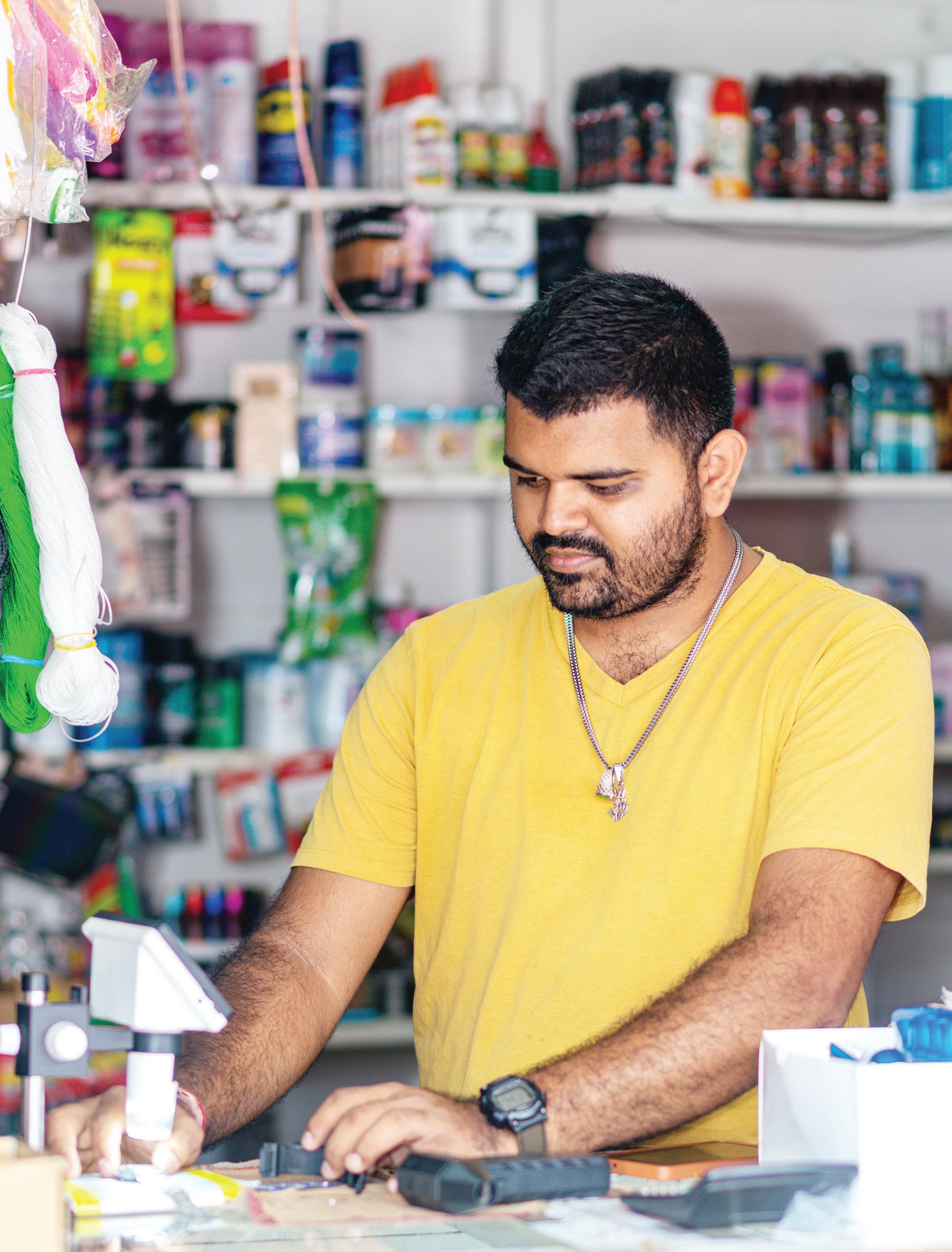
Sunday, April 27, 2025
As his father battles illness, 24-year-old Ravindra Singh works to preserve a family legacy while calling for collaborative development in his hometown of Bartica (Japheth Savory photo)
Becoming a mechanic was the best thing that has happened to North Rupununi native
By Michel Outridge
DESPITE not having any formal training in mechanics, Robert Jacobis is earning a living in his community as the go-to mechanic and is wellknown among the locals.
Narrating his story, the 50-year-old said he is a native of Massara, North Rupununi, Region Nine, but his wife is from Karasabai Village, South Pakaraimas, and he settled in that village years ago.
Jacobis added that, since the age of 18, he started to dabble in fixing engines. Coming from an agricultural background, he was always around agricultural equipment, and when it stopped working, he had to learn to fix it.
The father of six stated that his mechanical journey started with fixing tractors, Land Rovers and pick-up trucks.
Jacobis related that he went into mining and worked in Regions Seven, Eight and Nine,
and for one year, he worked alongside a well-versed mechanic who was known for his skills in fixing all engines and machines.
He told the Pepperpot Magazine that he learned a lot from the elder gentleman, an Indian fellow, who encouraged him to stay focused, and he took his advice and was eventually able to grasp the skills.
“Learning to become a mechanic was not easy at all; this big man was okay, but he cursed
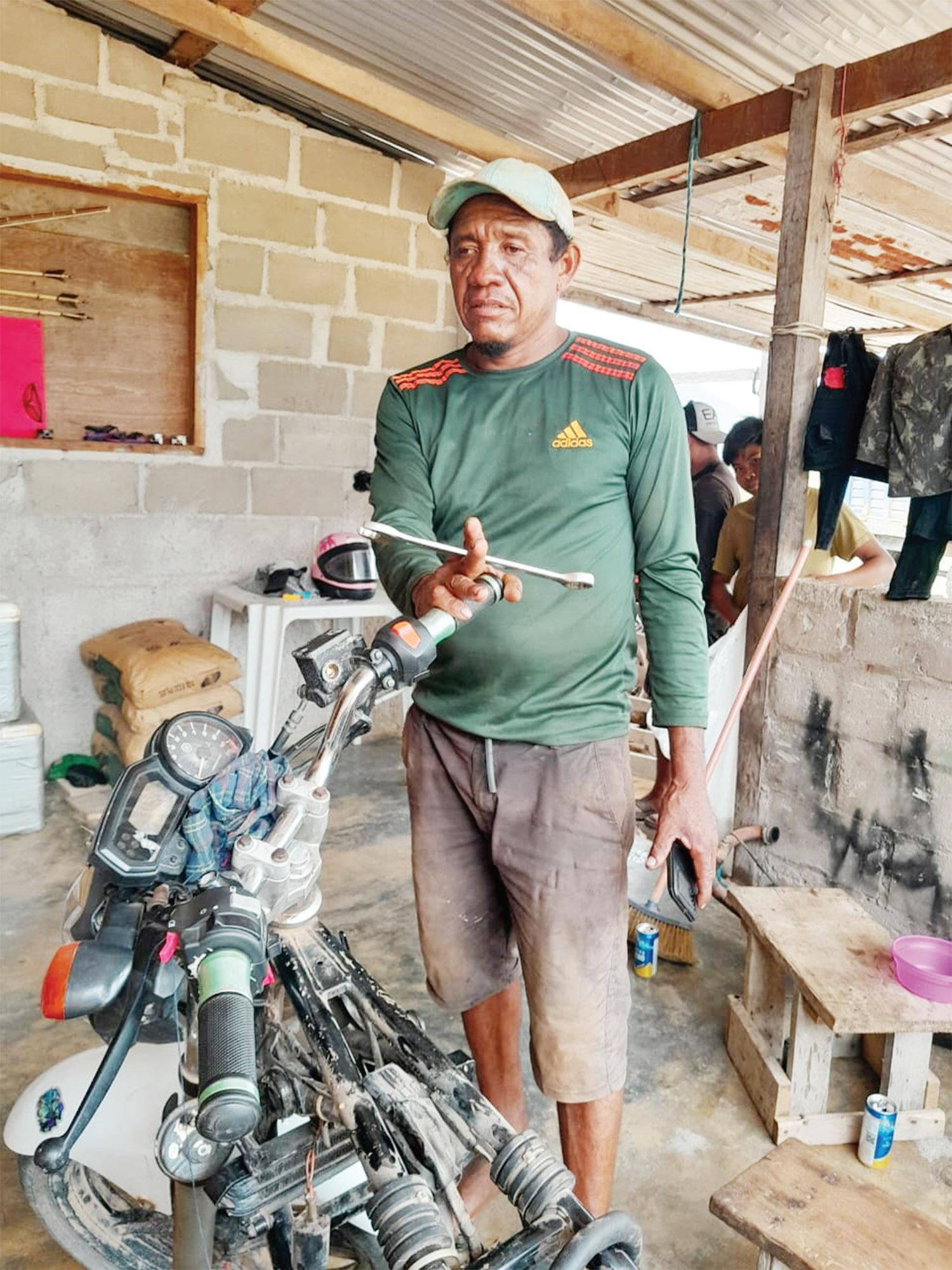
me non-stop for one year straight, and I had to get it right,” he said.
Jacobis reported that today, it is safe to say he can fix almost any-

thing. The mechanic pointed out that in his village of Karasabai, a remote place, he is always busy fixing brush cutters, excavators, trucks, bicycles, motorcycles, among others on the spot and at his tyre shop.
Jacobis’ tyre shop is at a friend’s house, and there he would have frequent visitors waiting to have their engines or vehicles fixed.
He explained that since most people in the village utilise bicycles and motorcycles, he has plenty to fix almost daily because people use them to travel great distances where transportation isn’t fixed.
At times, Jacobis is required to get out of his comfort zone and go to different places to fix vehicles, and he would work around both the north and south of the community.
Without qualifications as a mechanic written on paper to show, the self-styled
mechanic told the Pepperpot Magazine that he learned over time to become good at his job, and that gained him the respect he needed to elevate his small business.
In addition, Jacobis revealed that he used to look at YouTube videos on how to fix certain engines and machines, and that helped him to upgrade his skills.
Sometimes, he would venture into the hinterland to work as a mechanic, but mostly he likes to be at home, close to his family.
Jacobis said life in Karasabai Village is peaceful and quiet, the air is fresh, and the people are good and familiar to him; they co-exist in harmony.
He noted that Karasabai Village is a natural environment with a splendid backdrop of the mountains, and they have plenty of space to do whatever they need to earn.
Robert Jacobis doing what he does best, working on a motorcycle
Picking Up the Mantle of the Family Business
As his father battles illness, young entrepreneur works to preserve a family legacy while calling for collaborative development in his hometown
By Shaniya Harding
ON the edge of the Bartica Arcade is a little shop that has an old soul, with a young entrepreneur at its helm. Ravindra Singh is the owner of Laban’s Variety, a business his father owned and operated for several decades before handing it over to him. A little business that seems to have everything, is lined with watches, electronics, perfumes, and decorative pieces and is one of the oldest stalls in the Bartica Market.
Now twenty-four years old, Ravindra has been around the arcade for most of his life. As a child, he would pass through the rows helping older vendors, trying to stay useful, trying to learn all he could about the market he found so interesting. As he shared, “At a tender age, I liked being in the market. I used to come through the arcade, helping people, finding something to do.”
Now, he’s preparing to take over the family business officially. The paperwork is still in process, and the name is being transferred from his father to him, a long and arduous process, he says. “I am now taking over my father’s business. I am working on getting my licence and paperwork right now.” He added, “In the past, it was my father. Now we are going to switch it to mine.”
More than a business, Laban’s Variety Store is to Ravindra his father’s legacy. To him, it’s more than just a way to earn money. It’s something built across generations—something that represents time spent, time earned, and now, time passed. “Everybody got a hobby. Everybody got their own method into, you know, getting money. And for us, my family, we earn money and make a living with this business.”
But things have changed for the business in recent years. Especially since the pandemic, the arcade has not been the same. Fewer people
come out. The energy that once buzzed through Bartica during big events like Regatta has slowed down. “For a couple of days, the arcade was a little challenging for us,” he added, “People ain't walking, people ain't coming out—put aside pandemic, naturally everything change up rapidly.”
Even now, during the peak season, the stalls are quieter than he remembers. “We used to beg people to not pass this place. Imagine this is Regatta time, like now—we don’t sleep, we walk,” he further added, “This is the first time since I know myself this place has gone to sleep.”
Some of the changes, including movement restrictions and stall restructuring, have impacted vendors in small but real ways. “They have decided to do certain things where it kind of impact we as vendors in our little ways.” In response, he’s been adjusting the way he does business. “We got to use different methods and strategies where we could occupy different things,” he said. “We gotta come up with different strategies, and these things pitch it a little technical because those little things were our day-to-day living.”
Still, he tries to keep the business afloat, not just for himself but also for his family. When sales are low, and the cost of things around them continues to rise, the pressure adds up. As Ravindra shared, “Selling business as it is, when you don’t get the customers you used to, and you still have to provide stocks and pay the government, it is hard sometimes.”
Beyond business, Ravindra’s mind is on his father. His father, now 71, has been battling serious health issues and is currently undergoing dialysis. “My father already gone on dialysis a month now. It’s very expensive.” He added, “We have to find close to 80,000 now, three times a week.”
With rising health costs and limited options in Bartica, families are forced to
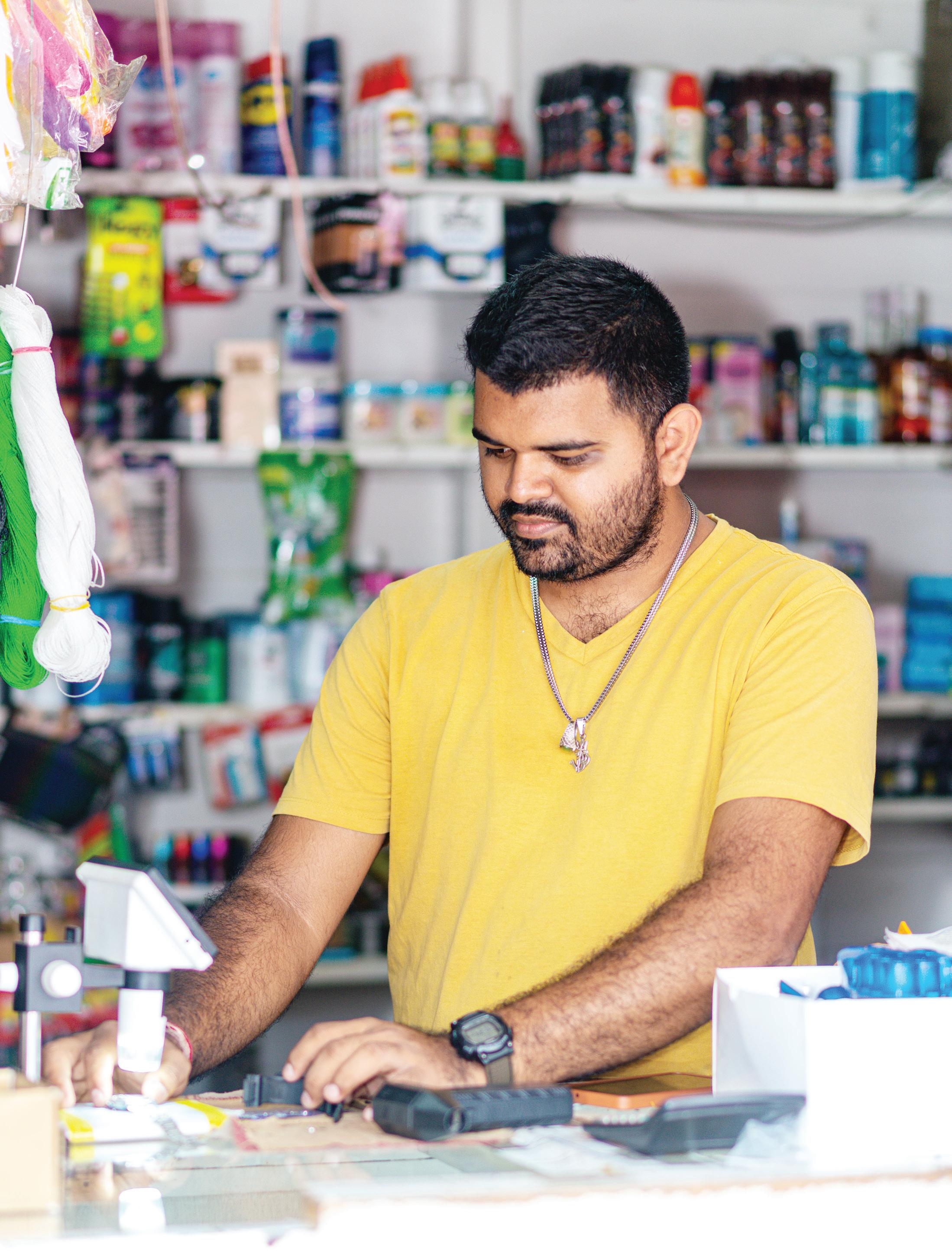
As his father battles illness, 24-year-old Ravindra
works to preserve a family legacy while calling for collaborative development in his hometown
travel to Georgetown for treatment. This is something Ravindra says he would like to see changed. “Personally, right now, I am concerned about the dialysis machine.” He added that although the region has seen major im -
provements in recent times, he still would like to see a dialysis machine closer to home. Ravindra stated, “The government knows what is best, and there are good things happening in Bartica.
Singh
of Bartica (Japheth Savory photo)
A Staple of Bartica’s Market Scene
By Shaniya Harding
KNOWN by visitors and Guyanese alike as the gateway into the interior, the township of Bartica is home to some of the most diverse and community-driven businesses. With the recent completion of the yearly regatta, the region’s vibrant entrepreneurs have been in the spotlight. Although the area sees an influx of new businesses each year, there are still a
number of vendors who make their mark all year round. Vendors like Govin Ram are constant fixtures in Bartica’s marketplace, and after more than a decade in the town, Govin has become part of the fabric of Bartica and the people who call it home.
Known by most people in Bartica as ‘Harry,’ Govin came to the community more than 13 years ago. “I came over here to sell and I
ended up staying and doing vending here all the time for 13 years,” he said. Originally from Parika on the East Bank of Essequibo, Region Three, Govin has long called Bartica his home, and its busy roadside market his place of work. Speaking to Pepperpot Magazine about how work has been recently, he stated that business has been slower with the introduction of newer businesses.
“The business was going nice, but now the
business, when nobody comes and starts selling, it’s slow. Things are going nice still,” he shared.
The Bartica market, like any other in Guyana, ebbs and flows with the seasons, with people, and sometimes even the weather. But events like Bartica’s regatta bring an influx of people, including tourists and Guyanese alike. With tourists seeking to enjoy an authentic Guyanese holiday, they are always on the lookout
For over a decade, vendor has served locals and tourists alike, adding flavour to Bartica’s tourism and community life
for fresh vegetables, interesting Caribbean fruits and, perhaps most popular, water coconuts. As he shared, “People like water coconuts, especially the tourists; they look for water coconuts when the sun is hot. So I buy plenty and just chop it up and give it to them with a straw,” he said. Sundays, for Govin, are a mix of business and leisure. With Bartica’s beach having a celebration almost every Sunday, Govin ensures
that every once in a while, he heads down to enjoy the sand and sea. “By the half day, we don’t sell. We are out there on the beach, too,” he added. “So, we got to enjoy ourselves Sunday, too.” This is why the work leading up to Sunday matters so much. Govin’s week follows a strict schedule, with fruits coming in on Monday and being sold all the way up until Sunday when he has to buy goods again.
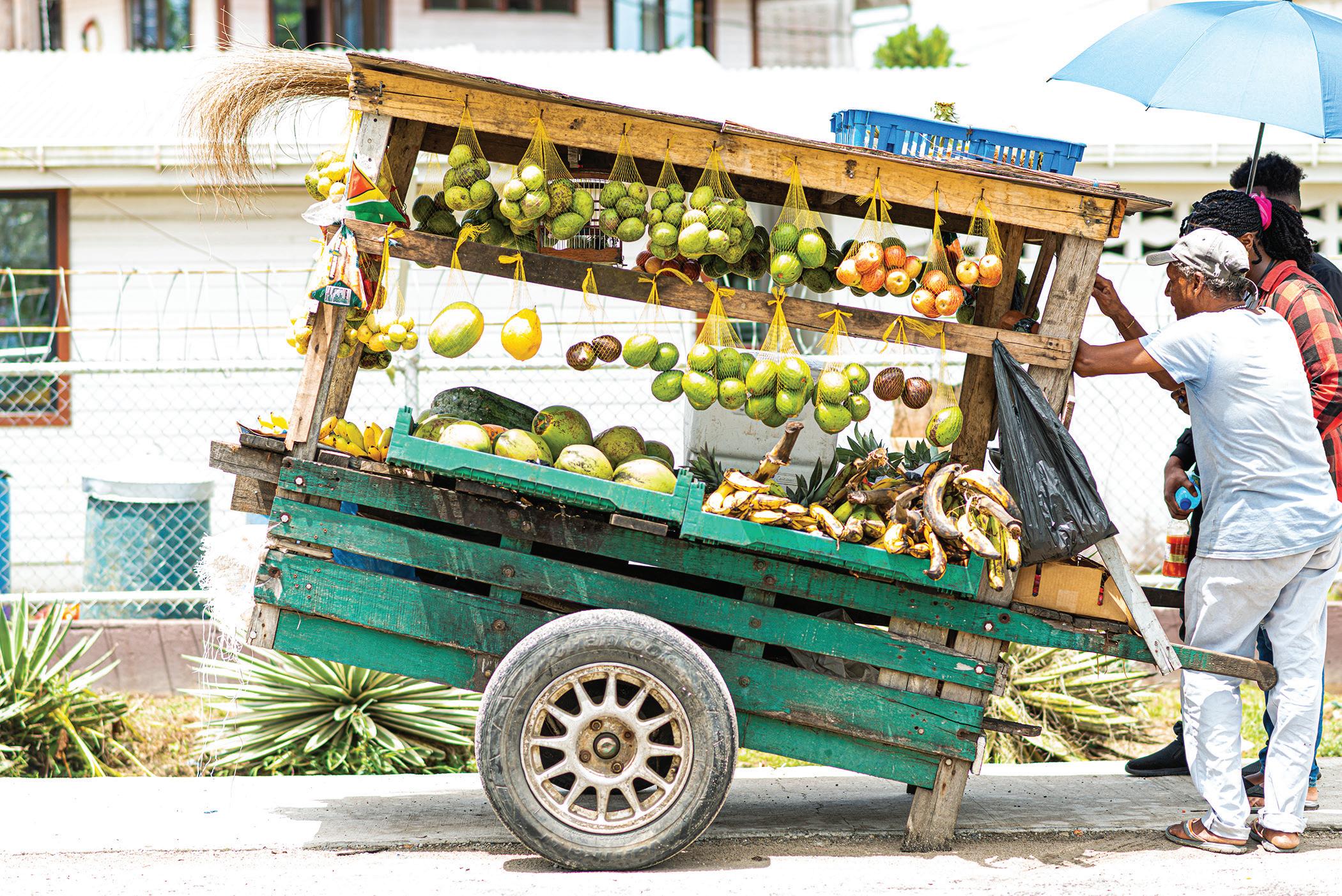
Reflecting on change, community, and the spirit of Bartica Regatta
Sharing how his hometown has evolved over the years, from childhood street games to running a thriving sweet shop in the heart of town
By Shaniya Harding
FOR Shahid Mohammed, Bartica is more than just where he has his business. It’s the place he calls home, the town where he grew up playing street games with his neighbours and now watches new generations grow up in a changing world. He has lived through the shifts, seen how the town has evolved, and remembers a time when life felt simpler and more connected, where traditions were a way of life.
In an interview with Pepperpot Magazine, Shahid shared, “I was born in Bartica. I go to school right here. 4th Avenue, 1st Street,” he said, recalling his childhood. He further added, “Growing up in Bartica, I had plenty of friends. We had many games we used to play, all the different games—games that children today maybe never hear about. But we had fun.”
Reminiscing about his earlier years, Shahid shared that he remembers a time when the streets were filled with laughter and camaraderie, not smart-
phones and social media. “These days, now with the new generation, they only know about cell phones. Cell phone gadgets,” he remarked. It was during these younger years that he opened his business, Fineman Confectionaries—a calling name given to him because of his appearance when he was younger.
The businessman, now 56 years old, notes how much Bartica has changed, especially socially. “In my days, growing up in Bartica, we didn’t know about division. We lived together as one big family.” He said that even discipline in the community came from all directions, with the saying 'it takes a village to raise a child' having a very deep meaning in those days. “Even my neighbours, if they saw us doing something wrong, they could talk to us,” he recalled. “But now, this generation, you can’t do that,” he added.
He believes the shift in how children are raised today has contributed to the issues communities now face. “Nowadays, a lot of parents,
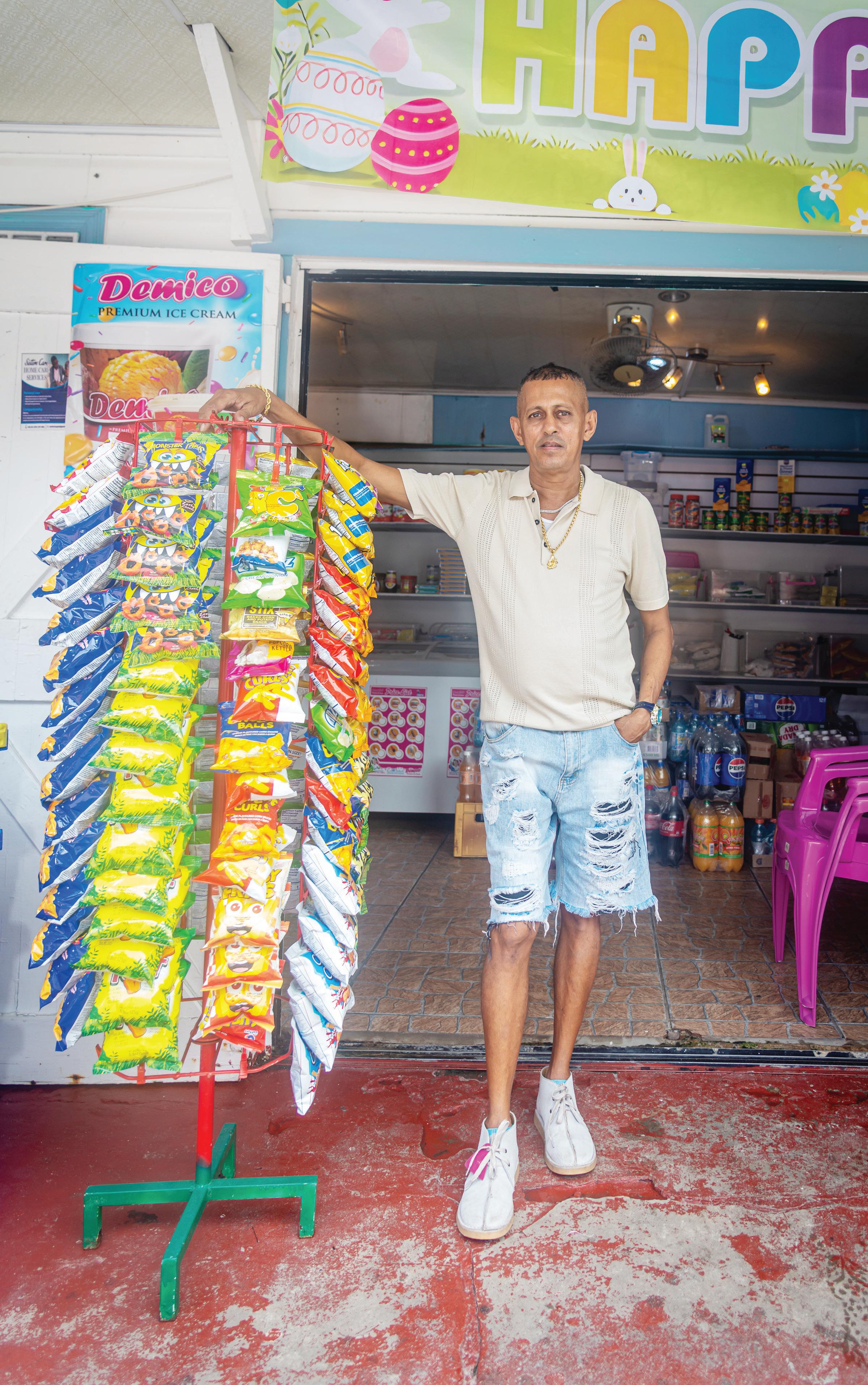
Shahid Mohammed, one of Bartica’s proud business owners (Japheth Savory photo)
Taking charge by making a difference for youths
By Michel Outridge
IF anybody had told Valini Leitch that she was going to wake up every day and be naturally excited to go to work, she would have doubted that—but today, she loves what she does for work, and it shows.
She is a lady who wears many hats: she is the Senior Project Associate, Communication Lead, and Coordinator for the Youth Enhancement Project (YEP) within Food for the Poor (FFP) Guyana.
Apart from investing a lot of time at work in the field, she loves to spread awareness by doing gender-based violence activities.
As an animal lover, Leitch, a Cummings Lodge, East Coast Demerara resident who now resides in Dia -
mond, East Bank Demerara, told the Pepperpot Magazine that she has two rabbits, three cats, and a very spoiled dog as pets.
She grew up in a single-parent home, raised by her mother, but was never alone since she lived in an extended family setting with her grandparents and an aunt, who didn’t have any children but whom she became very close with while her Leitch’s biological mother worked to provide for her.
Leitch, a mild-mannered woman with an air of humility and a reassuring smile, is always willing to help others. Through her office at FFP, she is lending support to the second batch of youths in the YEP programme offered by the non-profit organisation.
The mother of an adult daughter related that she believes in self-acceptance, love, humility, and humanity and that children have a special place in her heart since she would go beyond and above to see their needs are met as it relates to skills empowerment and education.
“My passion has enabled me to work with children across the country from 2022 to the present, and it has taught me that it doesn’t matter where you come from. It is okay to have dreams and to make them a reality,” she said.
Leitch added that one time, she went to Yarakita, Mabaruma sub-district, Region One, and met a young boy who had the warmest smile when she was working on the ear -


ly education project launched in the village by FFP Guyana. She related that her encounter with the boy stayed with her, and when she returned home, she documented it because she couldn’t stop thinking about that little boy.
Leitch reported that in another instance, during a visit to Imbotero Village, a remote Amerindian community that borders Guyana and Venezuela, she interacted with locals, but one little girl, who was
Valini Leitch and her daughter, Naja Anna Leitch, when she graduated in Costa Rica
Becoming a mechanic...
FROM PAGE II
Jacobis reported that he would often look at mechanical videos online to keep things fresh and stay updated so that when challenges arise, he would be able to handle himself in the field of mechanics.
“I don’t have the papers, but I can do the work, so I don’t let that bother me though, since I never had the opportunity to go to Guyana Technical Institute or any workshop to benefit from certified training,” he said.
Jacobis added that being able to utilise his skills to assist others is a good thing for him, and he uses his time to also empower the youths to learn a trade to be skill-ready for work.The mechanic is rated among the best among his peers and in his ‘neck of the woods’, so to speak.
Jacobis told the Pepperpot Magazine that his positive attitude and willingness to learn also played a vital part in becoming the person he is today, and he is grateful for that.
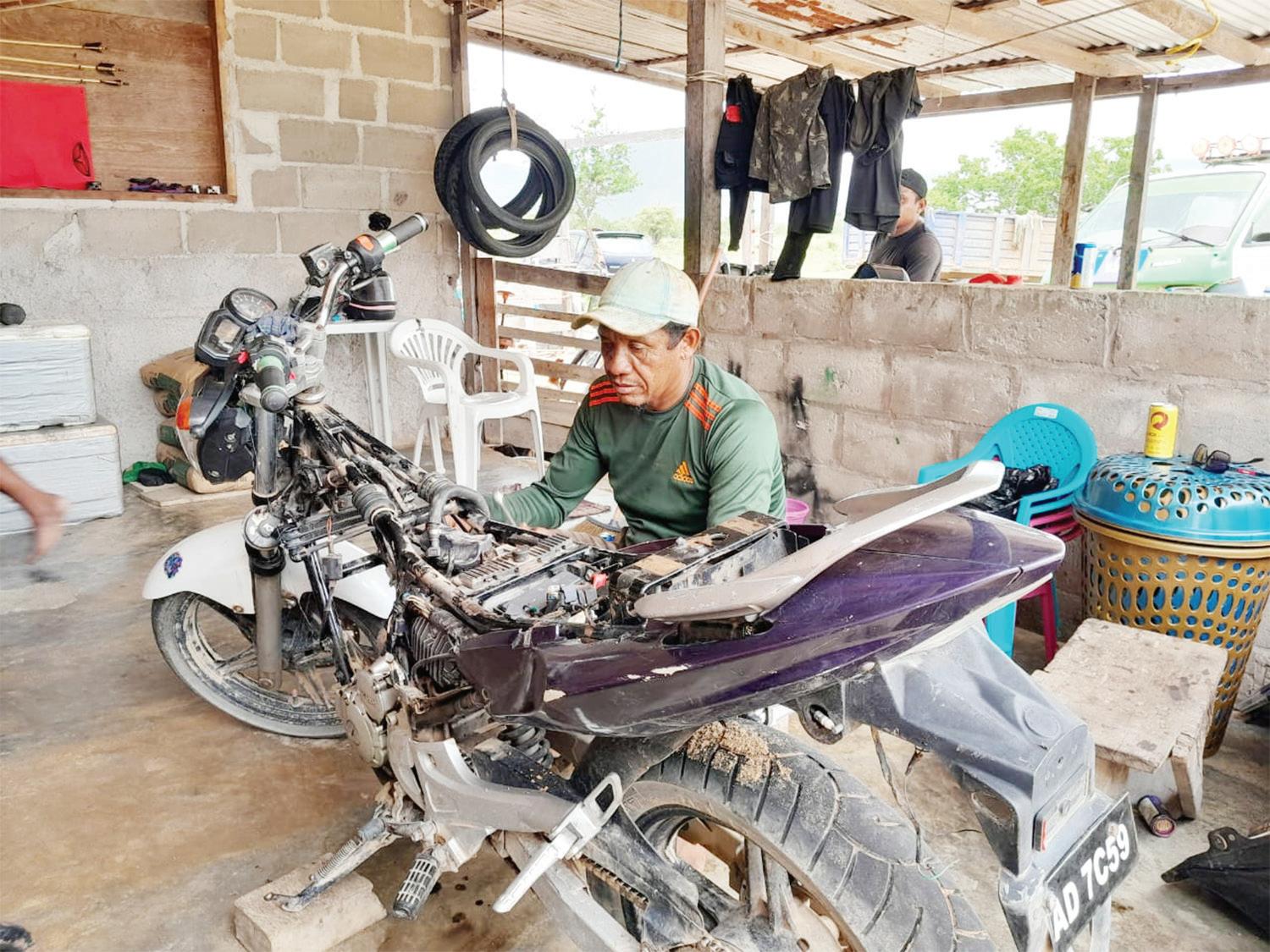


Robert Jacobis, the mechanic of Karasabai Village, South Pakaraimas

Reflecting on change...
FROM PAGE V
not only in Bartica, in the entire Bartica, a lot of parents, they do not take complaints about their children, and they do not want anyone talking to them.” He further added, “That is why we find a lot of lawlessness going on, because if I see your kids doing something wrong, and you don’t want people to talk to them, give them advice, it becomes a life sore, gradually, gradually, gradually,” he explained.
Despite this, Shahid still sees promise in the town. Over the years, Bartica has undergone visible transformation.
“We got a lot of changes, big changes,” he noted. “We have de -
velopment going on. Plenty of development going on in Bartica. This is not 100%, but at least we are seeing changes,” he said. He’s one of the many small business owners contributing to that development and the town’s growing economy.
His own journey as a businessman started humbly. “When I first opened, my business was like 6 feet by 8 feet. And gradually, right now, I got over 20 feet for my two businesses.” Shahid now operates from the Market Extension area, known to locals as “the Arcade.” It’s a place where vendors and customers alike gather, creating a lively space in the heart of town.

“This is the extension. Yes. It’s called the Arcade. Most of the time, it’s called the Market Extension,” he said. His shop, Fineman Confectionaries, offers a range of sweet treats and is a regular stop for visitors and residents alike. “Bartica really is a lot of small business. A couple of people come and open new businesses,” he said. For Shahid, business isn’t just about selling,
it’s about being part of the community’s daily rhythm. And nothing brings Bartica alive quite like Regatta. “Regatta is the best time of the year. I would say, the biggest activity in Bartica is Regatta,” he said. “Regatta is bigger than Christmas here,” he added. He believes it is more than just an event; it’s a tradition that breathes life into the town and creates

opportunities for vendors like himself. “It boosts a lot of business. A lot of people are coming to Regatta. You know, there are a lot of sales. It’s a bit nice there.” And when asked about what he loves most about his town, Shahid didn’t hesitate: “I love living here because it’s quiet here, not too crowded, and the people are really nice,” he shared. He doesn’t drink
or smoke and lives a faith-centred life with his family. “I like the church vibe. My two kids, they big, but we go to church.” In a town often described as a gateway to the interior, Shahid Mohammed reminds us that Bartica is more than a place you pass through—it’s a place where generations are raised, businesses are built, and community still matters.


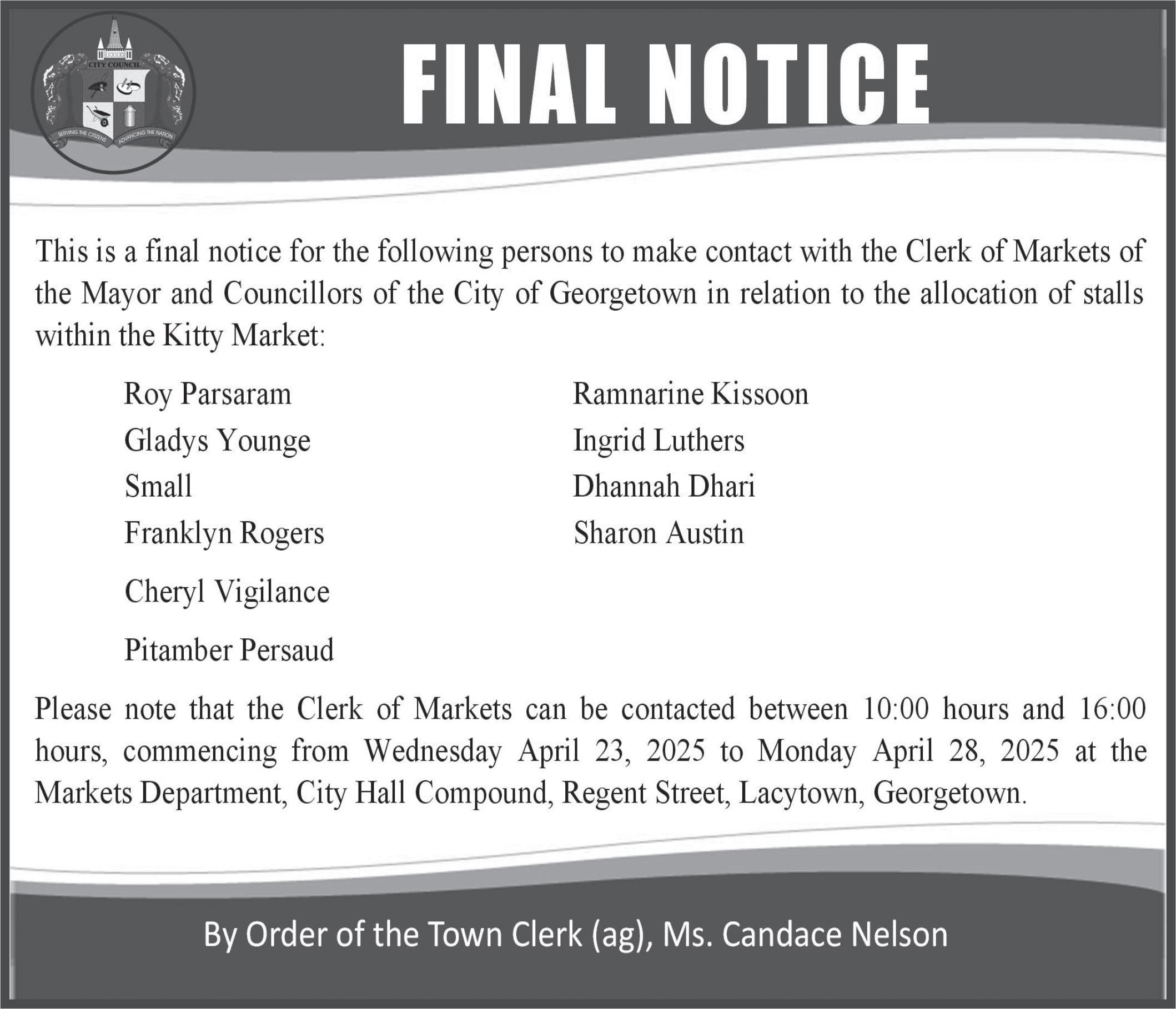


Taking charge by making...
FROM PAGE VI
four years old, stood out because she was articulate, poised, bold, and brave when she told her she wanted to become the President of Guyana.
Little Annabelle was very sure of what she wanted to become and stood so proudly, saying that aloud to the gathering.
“It is these things, these chance encounters with people, that stay with me, adding comfort and hope within—that dreams do come true, and the environment doesn’t mean you cannot achieve the goals you intend to,” she added.
Leitch told the Pepperpot Magazine that it has been very
rewarding working at FFP Guyana and that Andrea Benjamin, the Chief Executive Officer (CEO), is not only a boss but a leader among the 49 employees there.
The FFP Guyana staffer reported that she is often motivated by the positive outcomes of youths that she would have helped to
TURN TO PAGE XV



Picking Up...
FROM PAGE III
But the only thing I would like to see is for this town to have a dialysis machine like the one in Georgetown.”
The journey isn’t easy, especially for the elderly.
“The travel to town from Bartica is a hectic thing for elder individuals.” He added, “My father is an elder person, 71 of age, he can’t take the heat.” He noted that the structure of the arcade itself doesn’t help. “When sun start to play a part here, the heat up there, it’s not healthy for us.” His hope is that some simple changes can be made. “I hope they give us certain upgrades, for example, more height in the stalls.”
Ravindra has been speaking with the local council to raise concerns. He hopes to work collaboratively to
help develop the market. “I am trying my best to talk to the council to see what input they have.” He believes if enough people speak up, some attention could be given to the matter, and he has reached out to his fellow vendors and business owners to raise their voices and work with the region’s leaders.
The hope is that Bartica, now a township, will continue to receive the kind of infrastructure and services it needs. For Ravindra, the dream is to see the town grow while the people who live in it, especially the elderly, get the support they need. “I think if they fix the health side of our people, afterward they could put other things in place,” he said. “Health is a serious thing now.”
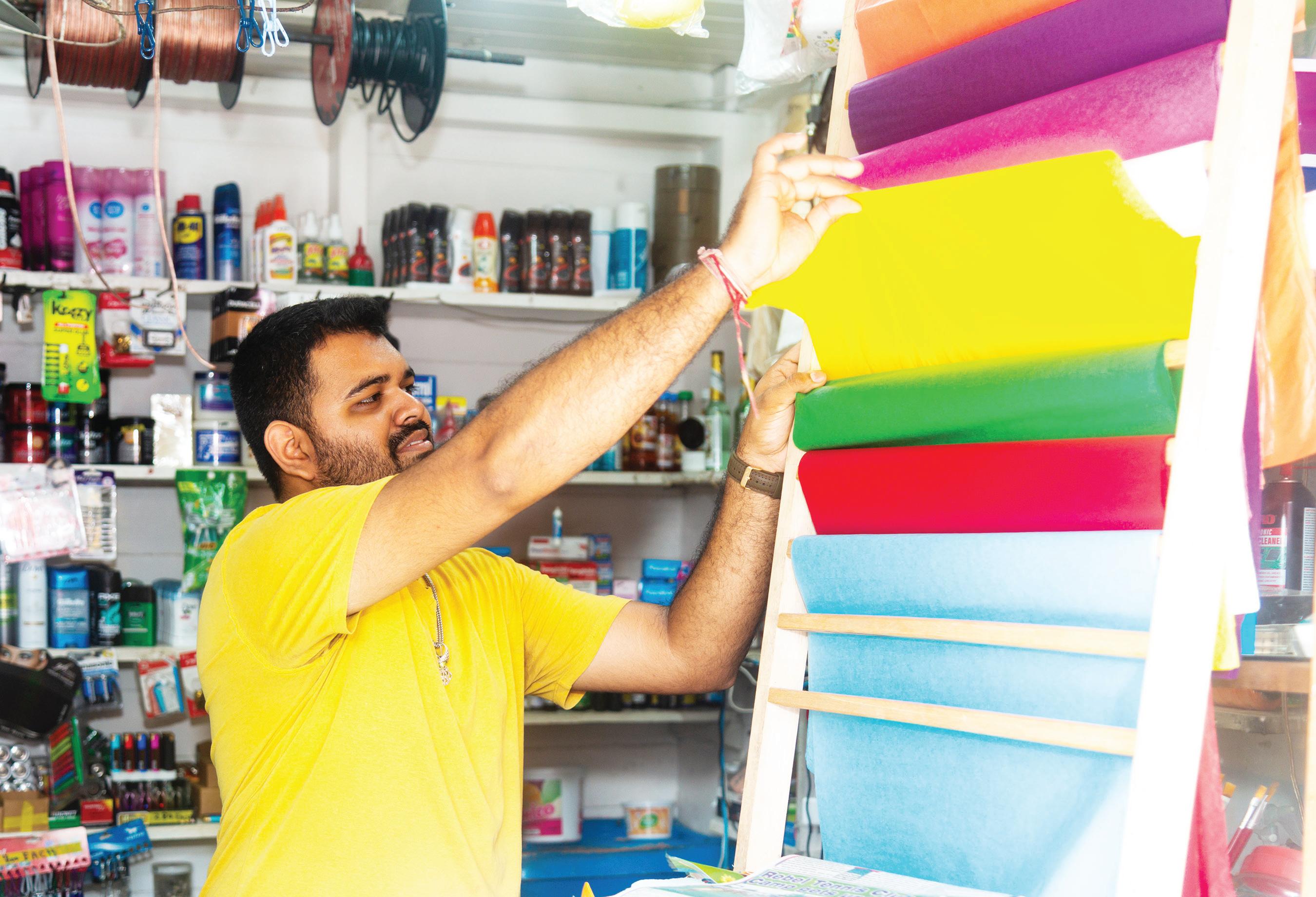

The business, while still running, is under pressure. The emotional weight of supporting his father, holding up the stall, and hoping for change all sit side by side. “It’s something very difficult to cope with,” he shared. As he continues preparing to take over fully, Ravindra is still determined to carve a new path in an old business. “Everybody know my father in the past. Now they gonna start to know me.” He knows the transition is more than just a business change; it’s a continuation of a legacy left behind by his father.

Now twenty-four years old, Ravindra has been around the arcade for most of his life (Japheth Savory photo)


A Staple of...
FROM PAGE IV
Govin knows the rhythm of the market better than most and can cater to the needs of his customers on a whim, being aware of what locals want and what tourists or visitors would look for. “Tomorrow, we are done with this load. Except
tomorrow, by the midday, this load must be done. So, next half day, we are dressed up and go to the beach. So, everybody can enjoy themselves tomorrow,” he shared. Although he is not a hotel owner or restaurateur, Govin plays an important role in the region’s tourism
landscape.
Although he has spent quite some time in Bartica, Govin says that most of his family still reside in Region Three. With the loss of his wife just three years ago and with all his children now adults, Govin says that most of his time is now spent in
Bartica, and it may be where he retires. “My mistress died about three years ago, and I am 58 now. I have children and all of them are big now, working and have their own families,” he added. “So I does go back sometimes.” The fruit stand has become more than

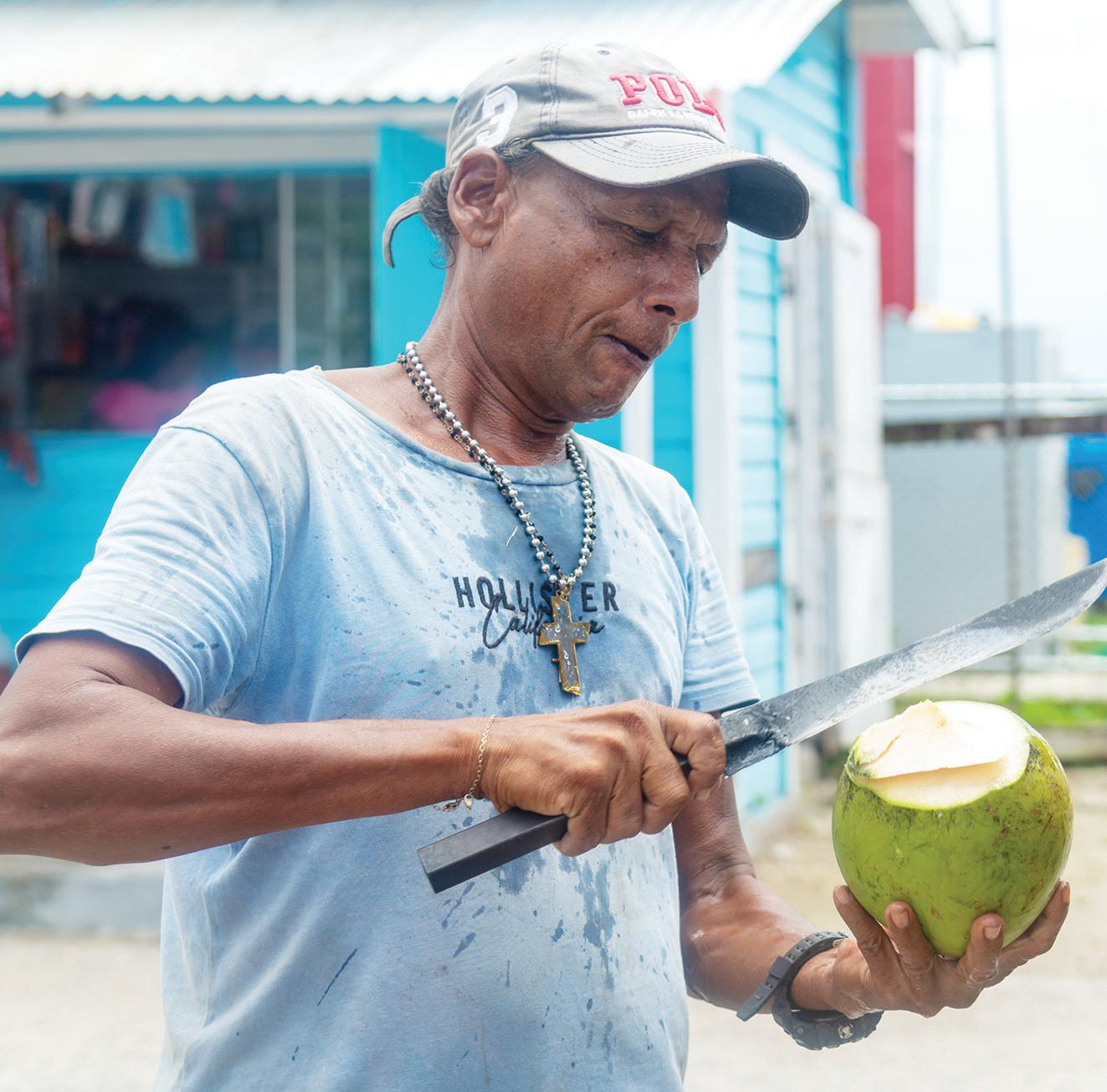
a source of income. For Govin, it’s a purpose and stability.
Although he loves making people happy with his vibrant, sweet fruits, vending is just one of the many jobs that Govin has done. “Before selling, I was a farmer in Parika. But that was kinda hard, and then for a piece of time I used to work in the bush. But so far, I like selling,” he said. Work as a fruit vendor is as simple as it is rewarding—meeting new people, with every day offering something new.
For Govin, financial wisdom means survival. He understands and is strict about the most basic principle of business: as a businessperson, you must reinvest in your business. “As a businessman, I know that I have to put money back into my business, my cart. That does not mean I do not go out to sport now and then, but I always have money in my pocket to say, well, this is going back to buy goods. You have got to keep a balance,” he said. This, he shared, is the secret to why his cart is always full and vibrant, constantly keeping the business going.
With over 13 years on the same strip, Harry has become a fixture to most Barticians, with some people buying fruits and vegetables daily and a few others buying wholesale every once in a while. However, as sustainable as vending is, it does come with some challenges. The shelf life and customer demand for some goods are among the main challenges for Govin. “Pepper is very hard, not too many buy pepper, and it spoils quick, so we will have to blend it and make pepper sauce,” he shared.
To Govin, this life is not just about selling fruit. It’s about legacy, independence, and pride in the hustle. A truly jovial man, Govin says that his advice to young people is to simply enjoy the simple things. Tasks as basic as putting together the fruits and vegetables on the cart daily give him a sense of fulfilment. So the next time you are in Bartica and in search of a cool water coconut, some fresh fruits, or just looking to hear a bit about Bartica, you could look for Harry’s Cart.
Originally from East Bank of Essequibo, Region Three, Govin ‘Harry’ Ram has called Bartica his home and its busy roadside market his place of work for more than a decade (Japheth Savory photo)
Taking charge by making...
FROM PAGE XI
mould, and seeing them blossom into success stories is very heartwarming.
Leitch pointed out that she feels like a mother to the 30 youths in her charge in the YEP programme at FFP headquarters, and she would be real with them, giving them heart-to-heart talks in raw scenarios about life experiences.
“Being authentic, being yourself, is what matters to me, and I am as real as it gets. I tell them (youths) the truth and guide them to make informed choices in a career path to become marketable for work, prepare them to become business owners, students, and people who excel in whatever field they choose,” Leitch said. She stated that be -

ing truthful to youths fosters healthy relationships and that they will eventually trust you, which doesn’t create a barrier.
Leitch noted that as a youth facilitator in the FFP Guyana YEP
programme, she has seen how education and opportunities empower young people and is always happy about their successes in becoming gainfully employed.
She is the mother of a 20-year-old daughter
who is the recipient of the coveted Anderson Scholarship for Caribbean and Latin America Excellence at the University of St. Thomas, Minnesota, USA.
Naja Anna Leitch graduated with an
Associate’s Degree in Business from the United College in Costa Rica. She was an undergraduate student in healthcare management and sustainability.












Shadows in the Night
SHE stood at the centre of the four-way street corner, a woman—fair and petite with darkbrown shoulder-length hair—and looked around.
It was 9:30 in the night, not too late, but the streets were dimly lit and silent.
She was rather surprised that the streets were empty at that hour. She had lived there since she was a little girl when there was music, loud voices from the intoxicated men in the rum shops, boys riding their bicycles through the streets and neighbours sitting on the culvert, laughing and guffawing.
“Where did it all go?” she wondered. “What happened to this once vibrant place?”
The dynamism of society and culture, it seemed, had changed.
“We had such great fun here, growing up from children to young adults,” she mused.
She had left through marriage but came often to visit, for it was where her heart was, and in her heart, no place was better than home. But as the years went by, many people passed away, including some of her girlhood friends whose funerals she attended, paying tribute to their lives.
There was a kind of emptiness as Maria stood there, the shadows getting deeper, and she wondered, “Are there still many souls here, earthbound?”
She took a deep breath and shook her head, chiding herself, “What am I thinking?”
She walked to her home, just a few steps away, and that night, she fell into sleep’s warm embrace. But on the streets, as the night grew older, shadows emerged—some who
had entered the afterlife but were still earthbound.
It was what she had wondered about, but as she slept, she didn’t know how close she was to the answer. She had a vivid imagination and had written several stories on departed souls and reincarnation, but her mind was curious to know more about the afterworld.
Her childhood friend, who had died four months ago and whose soul was still earthbound, knew of her curious mind. They had had many conversations over the years on the topic, and she stood there, a shadow in the dark, looking at the house where her friend slept. She felt pained that she had left the earthly life unexpectedly, missing her for all the intriguing stories, the laughter, and bits and pieces of gossip.
Morning dawned quiet and beautiful, and Maria awoke with a spirited feeling that it would be a good day. It was indeed a good day—for the cleanliness of the house was refreshing, the small repair works to be done were completed, and the day continued with tidying of the yard and picking of water coconuts.
Early in the evening, with the streetlight casting a glow on the street corner, Maria stood with a few neighbours from the back street, casually chatting. Then, as was expected, mention was made of her friend, who had died some months ago. Her memory was still fresh in the minds of those close to her, and Maria expressed, “It’s all about fate, who writes the script of our lives.”
That night, she sat up late writing in her journal, and as she wrote something more on the memory of her friend, she couldn’t
write ‘The End’. The pen hovered over the page and she wondered, “Isn’t it the end, or is there more?”
Maria returned to her home in the city the next
also visiting, and she met with him and his family two houses away for a little get-together. She was always happy visiting with old friends, many of whom
night when she took her leave to walk home alone, which was just a short distance away.
“I hope no ghosts follow me home,” she joked.

had migrated, reminiscing on the fun times of growing up. It was close to mid -
“There are no ghosts,” her friend assured her with a little laugh. She left for that short
walk home and walked into something that would leave an indelible mark on her mind—something she had been curious about— that appeared as real as ever. The earthbound souls emerged from the shadows, not getting close to her but walking on the streets. She took a deep breath as a strong shiver passed through her body, her heart beating rapidly, and her feet felt laden.
Every sound of the night seemed to stop as the souls, shrouded in shadows, walked the streets— stopping always in front of the houses that had been their homes.
“Why are you still here?” she asked in her mind.
“Because our families have not yet let us go…”
“I died before my time…”
The answers transcended into her mind and she heard it all, knowing who they all were from the houses in front of which the shadows stood. She looked a little longer at the shadow in front of her friend’s house and grief filled her heart.
“You’re still here,” she said in her mind.
“Yes, I need my story to end.”
A car’s headlights coming from the main road broke that strange occurrence, bringing energy back to Maria, and she hurriedly walked home.
For the remaining hours of the night, she did not sleep—scared now that she had stepped a little into the afterlife, where she should not have gone.
“I hope that does not happen again.”
In her journal, she finished the story of her friend’s life and wrote, “The End”, to free her soul.
day, and, one month later, she visited her birth home again. Another childhood friend from New York was

IT’S THE NATURE OF THE CHRIST CHARACTER THAT WE MUST EXPLORE
IT is the main character that we seldom relate to our age and time and discuss in detail, which gives relevance to whether we believe he lived or not. Instead, if we relate to what this young man—history tells us was named Jesus— stood for, we might tend to have a more in-depth understanding of how the age he lived in had so much more in common with ours, especially in respect of its values and actions, rather than its self-righteous proclamations.
From the very written dawn of his mission, it may not have occurred to us that he didn’t build a church or temple or what the standard of the day was. Nevertheless, he had strong perspectives and engaged disciples as followers of a religious philosophy that contradicted most of what existed back then.
This young man insisted on treating others as favourable to their interest, whether this was the greatest story ever told or was some gifted author’s masterpiece. His portrayed life and experiences do resonate—then as now—in reference to personal values, with a minority who can be referred to as manifest seekers of a better way. It reflected some conduct and practices from the more ancient world, which had declined by the age he stepped into.
For example, the spirit of the dead was ferried across a river—a habit that the Greeks adopted from the lore of Khemet. The difference with this procedure among these ancient peoples was that Charon of the Greeks was rewarded by payment of coins, possibly placed on the eyes of the deceased, to carry the deceased across. With his comparison, Maahaf
of the Khemetians (the ancient Egyptians), it was the worth of the deceased’s life that determined whether he would be escorted to the realm of the Gods or be abandoned on Earth. We must embrace the literature in the discussion, even as we explore its significant content, or have contended that it is much more than a fable—with a
tremendous leading character, its full content—and not forget that Jesus, as a child, was brought up in Khemet from his early childhood and was possibly brought up aware of their mystery systems, if not, as I suspect, nurtured by those systems.
But what were the profound teachings that Jesus could have challenged the world with? We must pre-
sume that he lived and was not just an ancient revolutionary writer’s dream hero.
To me, one of the most profound utterances attributed to Jesus is his reply to the Pharisees is:
“The Kingdom of God cometh not with observation: neither shall they say, lo here! or, lo there! For, behold, the Kingdom of God is within you.”
Whether we interpret these words through the lens of imagination or see them as a direct challenge to our personal responsibility, the message remains powerful: to reject deceit, avoid the pursuit of self-centred glory, and resist seeking power at the expense of the vulnerable—those who can be easily led down a path of hopeless self-destruction.
If he truly lived, this is not the kind of man favourable to our most popular humankind—of any age so far explored. Thus, he was murdered by priests, scribes, and paid thugs. It does make for the substance of deep conversation as we gaze at our diverse worlds through what Jesus is supposed to have said.


The Road to Publication
Beta Readers: Who they are and why they matter
AFTER the challenging task of incorporating developmental edits, I now have a complete second draft of Leech and am preparing to send it off to my copy editor for the book’s second round of editing. At this stage, I am also ready to step into another critical stage of the publication process: beta reading. For many writers, this is the first time their manuscript meets the eyes of the public—albeit a very select group. But what exactly is a beta reader, and why are they such an important part of the journey?
A beta reader is someone who reads your manuscript in its near-final form and provides feedback
from a reader’s perspective. They are not there to correct grammar or line edit. Their role is to highlight parts of the story that may be unclear, inconsistent, or disengaging. In short, they help you see your work the way a reader will. Who Makes a Good Beta Reader?
Choosing the right beta readers is crucial. They can be family, friends, acquaintances, mentors, or strangers—as long as they’re genuinely interested in your genre and reflect the demographic you are writing for. If you are writing a psychological thriller, for instance, your beta readers should be fans of that genre so they will understand the
structure, tone, and expectations inherent in the style, which makes their feedback far more useful. It is also important to recognise the potential for bias when selecting your beta readers. The closer someone is to you, the more likely they are to either hold back or soften their feedback. This is why a balanced group is key—some familiar faces and others who have no personal stake in your work. I selected five readers – both male and female- across multiple age ranges for Leech. Two were relatives, three were strangers—but all were enthusiasts of psychological thrillers. This gave me a range of perspectives while still staying within
the framework of my intended audience.
Should beta readers be paid?
That depends on your goals. Some people offer beta reading services professionally, and those fees can rival editing costs. If your manuscript requires significant input and you are planning to publish commercially, investing in a professional beta reader may be worthwhile. However, if your work has already been through a developmental editor, you may only need informal readers who can provide general impressions. In that case, the arrangement can often be voluntary or come with a small token of appreciation.
Trust and protection
Of course, sharing your unpublished work with others can feel risky. If you're working with readers you don’t know personally, consider having them sign a non-disclosure agreement (NDA). It may feel overly formal, but protecting your work—especially before it’s copyrighted—is entirely reasonable. Reputable readers should understand and accept this request.
How you engage with beta readers is also up to you. You may send the full manuscript at once and set a deadline (I recommend no more than two weeks), or share it in sections and schedule check-ins. The approach depends on the availability and preferences of your readers. The
goal is to make the reading process smooth so their feedback remains authentic and focused.
Managing Feedback
When sending out your manuscript, be clear about the type of feedback you’re looking for. Are there specific areas you’re unsure about? Are there elements you want them to pay close attention to? I provided a list of questions to guide my beta readers and followed up with a call to discuss their responses. This helped ensure that their feedback was honest and useful.
Once you’ve gathered your feedback, the next step is to evaluate it. If the responses are generally positive with minor points
TURN TO PAGE XXIII


Neighbours Are Important
1. Who is your neighbour?
EACH person will have their own views about neighbours. Introverts prefer to live by themselves. Extroverts need a space to make and win friends. Some people may not have anyone living next to them. Others deliberately choose to move away from many people and live by themselves. The criteria for choosing one’s neighbourhood often depend on the individual’s personality.
A neighbour is someone who lives next to another person or is situated close to another. This does not refer to neighbouring
countries but rather to individuals. Some people have great love for their neighbours, while others dislike them. For some, their neighbours are like angels, but for others, they are like evil people.
In every community, the way neighbours interact will differ, but they are still neighbours. Measuring how a neighbour will respond is difficult, especially if a person moves from one community and lives in another. Each community may have its own culture, and some neighbours will adapt to that culture. Others may not and will remain unchanged within the community.
2. Where do your
neighbours live?
Some people still experience difficulty understanding who their neighbour is, since they do not think many people meet their criteria. Because of bad experiences, some people do not want anyone to be their neighbour and prefer to isolate themselves from the community. However, despite people’s best efforts, they cannot isolate themselves from everyone. Even if they lock themselves in their house, they will still have to purchase groceries, visit the doctor, pay utility bills, and attend work to earn a living. Therefore, they cannot completely shut themselves out from

everyone.
Keeping a distance from some people may be wise, but not everyone can take this approach. Some people have good intentions of helping others but need openness from them. If they clear their minds of past hurts and have positive interactions, they may very well find themselves relating with others who will make their lives enjoyable.
Finding good neighbours is not easy. Still, efforts should be made to live well with your neighbour. Those who choose to ignore others may find themselves in a challenging situation where they need help but have no one to come to their rescue. Neighbours are too important, so do not discard them. Give yourself the opportunity to learn about them, and then decide how close you want to be. At the initial stage, manage the amount of information you provide since not all may be genuine.
3. What do your neighbours need from you?
Giving to neighbours is often commendable. However, that must not become the norm since some people can become too dependent. Some people become neighbours because of their expectations of one another. Friendships must be
built, not just happen. This similarly applies to neighbours, where the relationship evolves over time. People may expect that being neighbours with wealthy or influential individuals will make life better for them. Oftentimes, such expectations are realised but not guaranteed. Some neighbours only want to receive, while others only want to give without accepting anything in return. Remember, the process of building a relationship will require that both parties are willing to share something of mutual interest, and over time, the friendship will develop. Neighbours do not have to give the same quantity or value of things to show their appreciation. Giving by either neighbour may include tangible and intangible things.
4. Helping your neighbour
Every neighbour must be seen as important. Neighbours can help one another since they live near each other. It is disturbing to see people living close but not communicating. They may be living angry lives. During an emergency, the help of a neighbour may be important, especially if no one in the household can provide assistance.
Every neighbour will have needs. A neighbour who is
wealthy, well-educated, or has many children may still have needs that they cannot fulfil by themselves. While some neighbours are willing to acknowledge their needs, others may be reserved and may not want anyone to know.
Not every neighbour will make their needs known. Therefore, others must be tactful enough to find out. As time progresses, some neighbours may share their needs willingly. Some of those needs may be known through conversations. Others may be identified through observation. However, once a neighbour’s needs are identified, efforts must be made to protect such confidential information. Not every neighbour wants their needs to be broadcasted. Confidentiality is not something everyone embraces. Those who recognise their neighbours as trustworthy may share deep issues with them, knowing such information will not be publicised. The needs of some people may be simple and harmless to share, but other needs may be very private and should not be shared with others.
People from time to time may have deep issues they do not want disclosed, as they do
The Road to...
FROM PAGE XXI
of correction, you’re likely close to being publication-ready. If the feedback is more critical, take the time to understand the recurring concerns. You may decide to revise certain areas or, if needed, conduct another round of beta reading to confirm those
insights before moving forward.
Don’t overdo it
It’s also important to know when to stop. Feedback, like opinions, can be endless. Beta readers are most effective near the end of the editing process— after your manuscript has gone through major
revisions and polishing. Bringing them in too early can open the door to unnecessary back-and-forth. In my case, I worked with a developmental editor first, then brought in beta readers during the copyediting stage. This allowed me to incorporate their light feedback while also

finalising the manuscript with my editor.
I’ll be honest—this is one of the more vulnerable steps. Working with professionals is one thing; handing your story to everyday readers is another. There’s always the fear that it could be misunderstood or dismissed,
and that could affect your confidence when heading to publication. But it’s better to receive that difficult feedback in a controlled, constructive environment than to face it post-publication. When done right, beta reading helps you refine your story and gain insight into how it will be received.
It’s one more layer of preparation—and reassurance—before your book is ready to meet the world.
If you’re curious about writing, publishing, or editing—or if you’d like advice—feel free to reach out at thewritemind@gmail.com.




Neighbours Are...
FROM PAGE XXII
not want such needs to be widely known. A workmate who needs a pay increase may be willing to share that need with colleagues who may assist them in obtaining that increase.
5. Protecting your neighbours’ possessions
Support is essential among neighbours. People must try to protect one another. Whatever possessions they have must also be protected. Neighbours should be concerned about each other’s well-being. They must do their best to live in harmony and also look out for one another without becoming involved in all the details of each other’s lives.
In some communities, burglars may try to invade homes. However, a vigilant neighbour who is at home may observe strange activity and take appropriate action. When burglars enter another per -
son’s property, the neighbour should avoid direct confrontation but contact law enforcement who are trained to handle such matters.
In cases where a neighbour mistakenly leaves their gate open, a concerned neighbour can communicate this to them so they can address it. If it is a manual gate, the neighbour might even assist in closing it. Remember, when a neighbour looks out for others in the community, they may also be doing something good for themselves.
For more information about Geary Reid and his books, please use these contact information, Amazon: http:// www.amazon.com/ author/gearyreid Website: www. reidnlearn.com Facebook: ReidnLearn
Email: info@ reidnlearn.com Mobile #: 592645-2240.






































April 27, 2025
STUDY SUCCESS
Dear Student, Welcome, dear reading friend. In whatever way you revise the work you have already learned determines your course scores. Start early and keep up to date if you want to do well. Plan your timetable to facilitate work best, and though you may find some subjects more challenging than others, refrain from ditching them. Life’s path is uncertain, because some subjects you dislike now may be important for your future. Persevere in all subjects and treat them equally.
Love you.
IMPROVING WRITING
Revisiting the Power of Paragraph Writing Note that the power of writing great paragraphs cannot be overrated in compositions. This ability keeps your effort stable and steadily moving forward. It also enables your reader to make sense of all the information you are unfolding.
First, let us refresh your knowledge on when to start a new paragraph. Five instances are provided here because they are sufficient to cover most occasions when you need to start new paragraphs. Study each keenly and try recognising when you have consciously used them correctly recently:
a) There is a change in time. b) There is a change in place. c) There is a change in the topic or in its empha-
THOUGHT FOR TODAY
“We must restore hope to young people, help the old, be open to the future, spread love. Be poor among the poor. We need to include the excluded and preach peace.”
POPE FRANCIS (1936-2025) Jesuit Resource, Xavier Academy
sis. d) There is a similarity between people, actions, or topic. e) There is a modification of an idea already expressed.
Second, how do you safely start-up a paragraph to influence its development? Coin the topic sentence to coherently hold the central idea of the paragraph and influence its development, and for variety and interest, practise using a different length, and composition at times.
Third, are transition words or phrases needed?
a) Yes, use transition words or phrases between paragraphs. They make your writing more engaging. (Note that this is the same technique you need to use within paragraphs to link one sentence to another.)
b) Use pronouns, transitional words and phrases, demonstrative adjectives, and adverbs to do this.
Examples of transitional words and phrases that bind paragraphs and phrases together are: However, moreover, further, nevertheless, also, by the same token, in the same way, and, but, on the other hand.
Your well-chosen words or phrases will prompt your reader to
establish relationships that already exist between your ideas, especially when you are changing them.
Fourth, you must coin an expected coherently phrased topic sentence at the beginning of your paragraph. Never disappoint or derail your reader with incoherence of thought.
Fifth, the truth of paragraphing skill is that if you are more advanced in writing your thoughts, your topic sentence can instead appear in any position within a paragraph and of course, it depends upon your writing style.
[Note that very experienced writers come up with an implied paragraph idea which is not expressed as a physical sentence. But at your stage you must use your topic sentence at the beginning of your paragraphs.]
Sixth, your concluding thought is introduced differently. Always use different transition words to start concluding paragraphs. Let them be much different from what you use in body paragraphs and the introduction.
[Remember the short paragraph called transitional paragraph? Well, it is written for the specific purpose of TURN TO PAGE XXXIX

Why isn’t gum disease considered to be a non-communicable disease?
THE World Health Organization (WHO) defines non-communicable diseases (NCDs), also known as chronic diseases, as those which “tend to be of long duration and are the result of a combination of genetic, physiological, environmental and behavioural factors.” So, why isn’t gum disease, known as chronic periodontitis, accepted by the WHO as an NCD, although this disease fits into the definition? To be honest, I really cannot answer that question. If I am to speculate, I would say that it is because gum disease has never been proven to directly result in death.
Dentists globally have, for decades, been empha-
sising the vital role printed communication plays in the fight to minimise dental caries and gum disease because of these ailments.
The American Dental Association, of which this author is a member, currently distributes millions of pamphlets as part of an international oral health education programme because the prevalence of gum disease is higher than heart disease, high blood pressure, diabetes and cancer combined.
Daily brushing and cleaning between teeth are important to your dental health because they remove plaque. Plaque is a thin, colourless, sticky film that constantly forms on your teeth. When you eat foods containing sugars and starches, the bacteria

bridging the thought expressed in one long paragraph or section to that in the succeeding one in longer works. This is not part of today’s information and is not more enlightened here.]
Look at the following illustrated skills:
1. See the central thought expressed in the first position in this paragraph.
The Englishmen felt that their trip had been successful. They certainly had not been treated as vassals but with the greatest hon-
our and courtesy; they had been immensely interested in all that they saw; the artists had made drawings everywhere they went, and a long book was written by one of the secretaries; letters had been exchanged by the rulers of the two nations. Had they opened the way for friendly trade and intercourse?
2. See how the topic sentence influences the fashion of this paragraph.
Several ghost stories centre around the mansion. It is said that whenever August has
in plaque produce acids which attack tooth enamel. The stickiness of the plaque keeps these acids in contact with the teeth. After many such attacks, the enamel breaks down and a cavity forms.
If plaque is not removed with daily brushing, it eventually hardens into calculus (tartar). As calculus forms near the gumline, gums can become irritated and inflamed. They become swollen and may bleed. The gums begin to pull away from the teeth and form pockets that usually become infected. If gum disease is not treated properly, the bone supporting the teeth is destroyed, and healthy teeth may be affected.
It may surprise you to
know that 50 percent of adults over the age of 18 and 75 percent of adults over the age of 35 have some degree of gum disease. It is never too early to start fighting back. Your dental team can remove calculus from your teeth and treat gum disease that has already appeared. But daily dental care is in your hands. Brushing removes plaque and food particles from the inner, outer and biting surfaces of your teeth. Several different methods are acceptable. One acceptable method for removing plaque is as follows: Place the brush at an angled position to the gums. Gently move the brush back and forth in short (half a tooth wide) strokes. Brush the inner tooth surfaces
followed by the chewing surfaces. Use the ‘toe’ of the brush for the inner front tooth surfaces. Do not forget the posterior faces of the last molars. Finally, brush your tongue.
For general use, select a brush with soft, end-rounded or polished bristles. The size and shape of your toothbrush should allow you to reach every tooth. Worn-out toothbrushes cannot properly clean your teeth and may injure your gums. Once the bristles start to turn backwards, it is time to change the brush. Usually, this occurs after three to four months of use.
One way to clean between the teeth is with dental floss. Flossing removes plaque and food particles from between teeth and the
gumline—areas a toothbrush cannot reach. The following suggestions may help to learn about flossing. Break off about eighteen inches and wind most of it around one of your middle fingers. Wind the remaining floss around the same finger of the other hand. This finger will take up the floss as it is used. Hold the floss tightly between your thumb and first finger with about an inch of floss between them. Use a gentle, “sawing” motion to guide the floss between your teeth. Hold it against your tooth, scraping the other side of it, as you guide it gently beneath the gumline. If none other is, this article is worth cutting out and keeping for constant reference.
two full moons, on the night of the first moon
Governor Dummer rides his white horse up the broad staircase as he did on the night of the grand housewarming in 1715. Another story concerns the smiling ghost of a child who peeped through the kitchen doorway. Not until her bones were discovered in a moldering box in the cellar and given a proper burial, did the little apparition vanish. It is also averred that the ghost of an English officer who was killed in a duel on the lawn
occasionally reappears in full-dress uniform, with powdered wig, embroidered cloak, and sword.
3. Look at this short selection showing the use of various transitional words.
To the visitor to South America, many things are strange. He is not only on another continent but in another hemisphere. However, he soon finds that any fears he may have had are groundless. The people are friendly and full of fun. The American who speaks
only English is likely to find that his attempts to communicate bring on outbursts of good-natured laughter in which he will be moved to join.
On the other hand, if he even has a few words of Spanish, the South Americans will make valiant attempts to understand him and will do their best to fill in the words they think he is using...
4. What do you make of the following paragraph?
His only alternative to escape from the labour of the
farm and the clamour of his wife, was to take a gun in hand, and stroll away into the woods. Here he would sometimes seat himself at the foot of a tree and share the contents of his wallet with Wolf, with whom he sympathised as a fellow-sufferer in persecution. “Poor Wolf,” he would say, “thy mistress leads thee a dog’s life of it; but never mind, my lad, whilst I live, thou shalt never want a friend to stand by thee!”
April 27, 2025

